Music Theory Careers
What can you do with a graduate degree in Music Theory?
Our students pursue a variety of careers, and our program emphasizes the importance of planning one’s professional development. Our program prepares students for work both inside and outside the professoriate. Recent graduates have obtained tenure-track roles at the University of North Carolina–Greensboro, the University of Arkansas, Morehouse College, Arizona State University, the Georgia Institute of Technology, Montana State University, Texas A&M University-Kingsville, and Oberlin College and Conservatory. They have served visiting or postdoctoral roles at McGill University, The University of Alabama, the College of Wooster, the Frederick Chopin Institute, the University of Birmingham (UK), and more. Our graduates are also working in orchestral conducting, composition, music copyright law, music research, medicine, and data science.
Explore career paths of our graduate alumni below.
How are Ohio State’s Music Theory students supported in their work toward careers of their choice?
Student research is supported by the College of Arts and Sciences, the Council of Graduate Students, on-campus research centers, The School of Music and theory/musicology travel funds, and external funding sources.
Advisors in Music Theory provide individualized advice and support. Our degree programs are flexible: each student’s program will be tailored to that student’s interests. Some pursue concurrent degrees in music performance or other disciplines.
Skill-building is available within and outside the formal curriculum. Each PhD student is required to obtain two research skills that directly support the students’ intended research area. Recent graduates have pursued ethnographic fieldwork, data science, statistics, languages, and game design, among others. Graduate teaching associates receive training from the Drake Institute for Teaching and Learning prior to starting their appointment, and through workshops that develop more advanced teaching skills. Many students complete Graduate Interdisciplinary Specializations in a complementary field to enhance their career preparation, or attend “boot camps” at the Erdős Institute. Ohio State offers a paid internship program where graduate students can gain hands-on experience in a Central Ohio arts organization.
Students and early-career alumni have access to 1:1 career coaching through Arts and Sciences Career Success, as well as workshops through Beyond the Professoriate/Beyond Grad School and networking through Ohio State's AlumniFire resource. The Career Accelerator Fund supports students who want to pursue experiential learning or other forms of professional development for work outside the professoriate.
Our Alumni
2020–2025
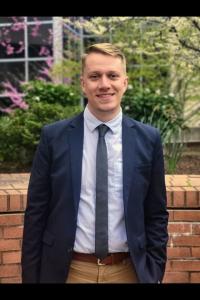
Zachary Lookenbill teaches as an Assistant Professor of Music Theory at the University of Arkansas. He completed his PhD in Music Theory in 2024. Lookenbill’s dissertation explored rhythm and timing in North American Drum Corps drumline and analyzed the musical and cognitive mechanisms that allow for synchronized and accurate rhythmic performance. His research used interdisciplinary approaches from music theory, ethnomusicology, and cognitive science to bridge the gap between music performers and music scholars. Lookenbill credits the extensive and well-mentored teaching opportunities he had as a PhD in equipping him with both the skills and confidence needed for his current job teaching undergraduate students. Additionally, with the support of incredible faculty mentors and diverse course offerings, he had the opportunity to develop interdisciplinary research projects that are still a part of his research program today.–
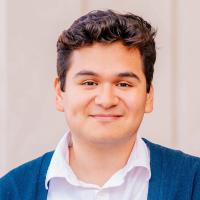
Gerardo (Gerry) Lopez is an Assistant Professor of Music Theory at the University of North Carolina at Greensboro. He earned his PhD in Music Theory in 2024 with dissertation research that developed a methodology for the analysis of the singing voices of robot-like figures, which bring aspects of mechanical, electronic, and/or digital technologies into songs and song-like music. Lopez values the interdisciplinary aspects of his time at Ohio State, crediting the many resources and opportunities available to him for helping develop diverse skills. He notes that he was able to work with students directly while having valuable mentorship support from professors to explore his own philosophy of education and teaching practice.
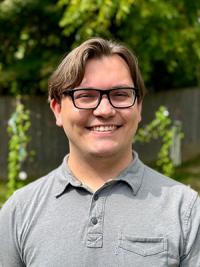
Alexander Sallade earned his PhD in Music Theory in 2024 and currently serves as Associated Faculty in Theory at The Ohio State University. His dissertation research, titled “A Taxonomy for Immersive Audio Techniques in Video Game Sound Design,” considered the use of immersive audio techniques (IATs) in video games and categorized twenty-three unique techniques into five categories based on their incorporation into the sound design and the resulting immersive effect. Drawing from music theory, ludomusicology, film studies, ludology and psychology, his work bridges multiple disciplines.
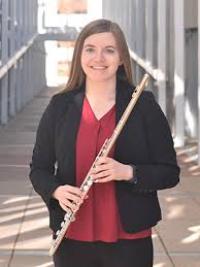
Meagan Gaskill earned her MA in Music Theory in 2023 before continuing on to a DMA in flute performance at Ohio State. Gaskill is a flutist/piccoloist who also works as a freelance musician in the Central Ohio region and serves as a member of the Columbus-based chamber ensemble, Zephyr Winds. Her thesis research explored the relationship between timbre, dynamics, articulation, and register to shed new perspectives on dynamic scaling within formula sections of Edgard Varèse's Density 21.5.

Samuel Gardner works as an Assistant Professor of Music theory at Oberlin College and Conservatory where he teaches Aural Skills and Theory courses. Graduating with a PhD in Music Theory in 2022, Gardner focused his research on gesture as an factor in music perception. Gardner’s work argued that gesture facilitates musical understanding by mediating the relationship between music producers and music perceivers.
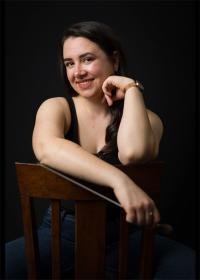
Samantha Burgess earned her MA in Music Theory in 2021. She works as the Assistant Conductor for Berkeley Symphony and Berkeley Community Chorus and Orchestra, and is also the Interim Music Director for the Oakland Community Women’s Orchestra for their 2024–2025 season. Burgess’ thesis, “The Triumph of the Wayfarer: The Performance of Form and Psychology of Narrative in Gustav Mahler’s Symphony No. 1,” addressed the gap that existed between theoretical analysis, cognitive experiments, and listeners’ experience of performance in the study of music.
Andrew Brinkman earned his PhD in Music Theory in 2020. He works as an Assistant Band Director for the Archer City Independent School District; he has prior experience as an Adjunct Professor of Music and Recruiting and Admissions Coordinator for Midwestern State University. Brinkman’s dissertation research provided an in-depth analysis of the Essen Folksong Collection and explored its origins, uses, and what it reveals about the nature of Western folk song.

Lindsey Reymore is an Assistant Professor of Music Theory in the School of Music, Dance, and Theatre at Arizona State University. She also co-directs the CACTUS Music Lab, and previously was a postdoctoral fellow with the ACTOR Partnership (Analysis, Creation, and Teaching of Orchestration) — a global network of musicians and scientists working on projects related to musical timbre and orchestration. Reymore completed a PhD in Music Theory in 2020. Her dissertation presented findings on an empirical investigation of the cognitive linguistics of musical instrument timbre and the applications of those results to musical analysis.
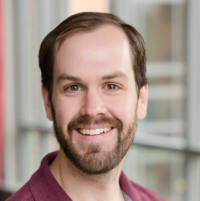
Nicholas Shea teaches at Arizona State University as an Assistant Professor of Music Theory in the School of Music, Dance, and Theatre. He also serves as the co-director of the CACTUS Music Lab, and studies how musicians from diverse backgrounds conceptualize and generate music's organizational components through performance. His research uses techniques such as behavioral experiments, corpus studies, and theoretical analysis. Shea earned his PhD in Music Theory in 2020; his dissertation explored the relationship between guitar performance and functional components of musical organization in popular-music songs from 1954 to 2019.
2016–2019
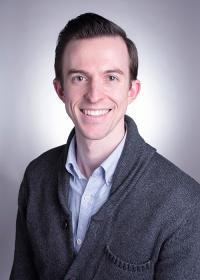
David Orvek earned his master’s degree in music theory in 2019. He teaches as a lecturer in Music Theory at Butler University and graduated with a PhD in Music Theory from Indiana University in December 2025. Orvek’s MA thesis, titled “Generalized transformational voice-leading systems,” analyzed the measurements, distances, and motions of elements and of a musical space, and how they related to the voice leading between two pitch-class sets.
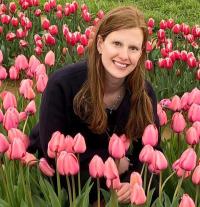
Lindsay Warrenberg works for the Healthcare Transformation Institute (HTI) as part of the University of Pennsylvania’s Perelman School of Medicine. Her work helps improve the accuracy and equity of Medicare’s main risk adjustment algorithm. Warrneburg is also the Associate Director of The Erdős Institute and has previously worked at Aware, designing ML models to predict employee energy levels and engagement from human behavioral data in enterprise collaboration platforms. She earned her PhD in 2019, and her research challenged prior understandings of emotional responses to musical stimuli by changing the way emotional terminology is used in examining human behaviors.
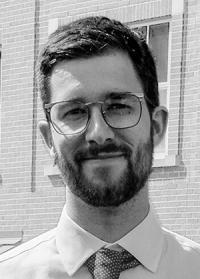
Hubert Léveillé-Gauvin is an operations coordinator at So-Prog, a not-for-profit collective rights management organization for makers of sound recordings and music videos in Canada. He earned his PhD in Music Theory in 2018. His dissertation investigated how technological changes have influenced popular music composition and how these changes affect music listening preferences. The study aimed to determine whether songwriting techniques have evolved due to technology and whether listeners' music choices can be predicted based on these compositional methods.
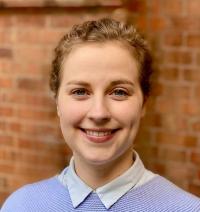
Caitlyn Trevor is a freelance Sonic UX Researcher based in Birmingham, UK. Her work helps brands and product teams enhance their sonic identity through data-driven insights and expert UX (user experience) research. Trevor has previous experience as a Teaching Fellow in Music in the department of Music Cognition and Emotion at the University of Birmingham. She earned her PhD in 2018 with dissertation research that focused on sound experiences and expressive performance choices. Her research analyzed the interpretations performers make when deciding how a score should sound and the influences of intuition, convention, convenience, artistic intention, among others, that impact the way a performance is given and received.
Alissandra Reed earned her Master of Music in Theory in 2017 with a focus on the descriptive analysis of music listening. Her thesis applied a critical approach to descriptive analysis by combining Schenkerian reduction, tonal and neo-Riemannian harmonic analysis, phenomenology, and empirical participant-based musicology to describe the experience of listening to Liszt’s “Il Penseroso.” Reed works as the Chief of Staff at KindlyMD and has a Society for Human Resource Management Certified Professional certification.
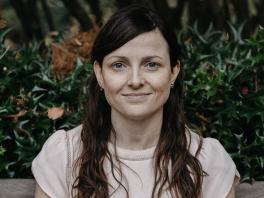
Claire Arthur is an Assistant Professor at the School of Music at the Georgia Institute of Technology and holds an Adjunct Professor position in the School of Psychology. She is the principal investigator for the Computational and Cognitive Musicology Lab at GTU, which focuses on building novel datasets and corpora, as well as the coordinated analysis of both musical and human-generated data. Arthur earned her PhD in 2016; her dissertation was an empirical investigation of musical experiences in context looking specifically how perceptions of scale-degree and rhythm are evaluated in relation to a local harmonic or metrical context, respectively.
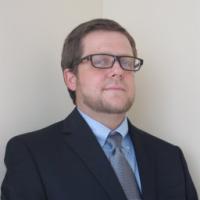
Aaron Carter-Ényì teaches at Morehouse College as an Assistant Professor in the Humanities, Social Sciences, Media, and Arts Division Faculty. He also works as an instructor of World Musics at Spelman College. Carter-Enyi completed his PhD in Music Theory in 2016 and analyzed contour levels in African tonal systems. His dissertation, based on two years of fieldwork in Nigeria, offered a new methodology for contour analysis to extend theory into an applied computational approach for a wider range of recorded music and without an association to scale or perceptions of tonality.
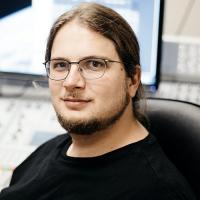
Nathaniel Condit-Schultz is the Director of Graduate Studies and Principal Investigator in the Computational and Cognitive Musicology Lab in the School of Music at Georgia Tech University. He also directs the rock and pop bands and teaches courses in research methodology, music psychology, and music production. Condit-Schultz graduated in 2016 with a PhD in Music Theory. His dissertation, “MCflow: a digital corpus of rap flow,” described the motivation, methodology, structure, and content of a new symbolic corpus of rap vocal transcriptions known as the Musical Corpus of Flow (MCFlow). His work presented an operational music theory of rap, identifying the most artistically important features of rapped vocals and their basic organizational structures.
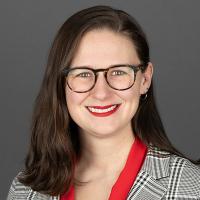
Dana DeVlieger is a Copyright Litigation Associate in the New York office of Latham & Watkins LLP, having previously worked at Kirkland & Ellis. She earned her MA in Music Theory from The Ohio State University in 2016, before then completing a PhD in Music Theory from the University of Minnesota (2020) and a Doctor of Law from Northwestern Pritzker School of Law (2023). Her MA thesis analyzed a corpus of 398 recordings of the Irish song “Whiskey in the Jar,” focusing on acoustic markers of Irishness (such as accent) as well as elements from other musical traditions. She explored how the song was performed in various ways and discussed the potential presence of an Irish feel in recordings that do not sound overtly Irish.
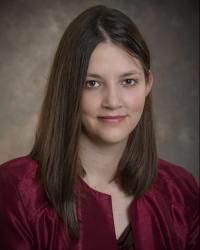
Jennifer England (neé Shafer) is a music faculty member at Montana State University, teaching courses in music theory and aural perception. She previously taught at the University of Delaware and Temple University with research interests in mathematics and computation in music and music theory pedagogy. England completed her PhD in Music Theory in 2016. Her dissertation investigated the use of wavelets for pattern recognition in music, with applications to classification tasks and analysis.
2000–2015
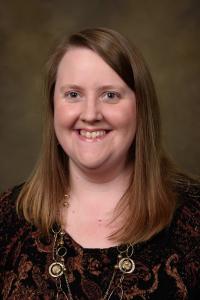
Angela Ripley graduated in 2015 with a PhD in Music Theory. Her dissertation research was a pedagogical game and cooperative learning approach to undergraduate post-tonal music theory. She adapted the show “Survivor” to frame a four-week unit on pitch-class set theory that had students of different achievement levels working together in small groups to complete worksheets/challenges that were then graded individually. While students' grades were based solely on their own work, the game element promoted peer mentoring through cooperative learning and inspired constructive peer pressure that motivates all students to do their best. Ripley teaches Music Theory as an Assistant Professor at Texas A&M University-Kingsville.
Andrew Farina is a Visiting Assistant Professor of Music Theory at Butler University. He graduated in 2014 with a PhD in Music Theory from The Ohio State University. His dissertation, titled “Temporal Organization in the Masses of Johannes Ockeghem,” explored how mensural music was structured in time, and how this structure reflected individual style, using Ockeghem's masses as case studies.

Yoojin Kim is the Director of the Korea Dalcroze Eyrhythmics Institute and an instructor at Myongji University, where she also founded the teacher training program. Using the Dalcroze approach she teaches music theory, aural skills, and keyboard harmony classes to undergraduate students and provides teacher training for musicians, art therapists, dancers, and music educators. She also teaches classes at Ewha, Sahmyook, and Kyung Hee Universities. Kim earned her PhD in Music Theory in 2007, and her dissertation research explored George Rochberg's approach to serialism, examining how he blended traditional musical elements with 12-tone techniques to create more accessible compositions. It also analyzed his theoretical contributions, particularly his monograph The Hexachord and Its Relation to the 12-Tone Row, and reevaluated his influence as a composer, theorist, and critic.
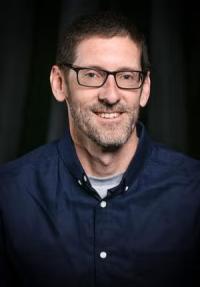
Peter John Knapp is a Professor of Music and Department Chair of Performing Arts at Long Beach City College. He graduated in 2001 with a PhD in Music Theory and his dissertation explored the music-theoretic contributions of Johann Fricker and Friedrich Oetinger, focusing on Fricker's psychological theory of musical perception, which applied mathematical concepts to explain how the mind simplifies complex ratios. He also examined Oetinger's metaphysical commentary on Fricker's work, highlighting their perspectives on the role of the sensus communis in understanding music.
